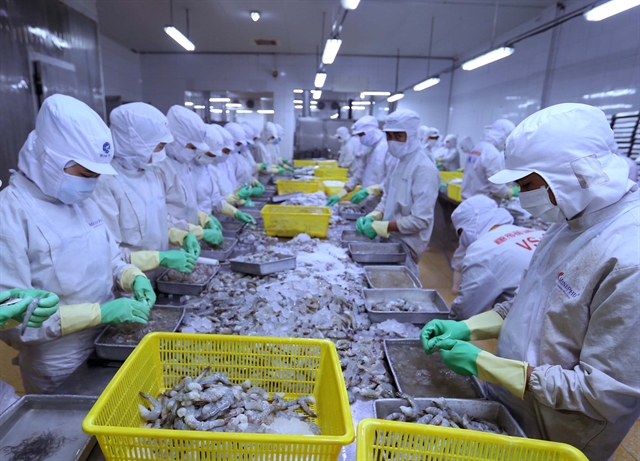The domestic shrimp industry considers the EU-Viet Nam free trade agreement (EVFTA) a good chance to boost exports to the EU market, according to the Viet Nam Association Seafood Exporters and Producers (VASEP).

The domestic shrimp industry considers the EU-Viet Nam free trade agreement (EVFTA) a good chance to boost exports to the EU market, according to the Viet Nam Association Seafood Exporters and Producers (VASEP).
Especially, tariffs on frozen prawn exported from Viet Nam to the EU will fall from 20 per cent at present to zero as soon as the agreement comes into effect.
The tariffs for other shrimp products are reduced according to the 3-5 year roadmap, while processed shrimp products will have a seven-year tariff reduction schedule, excluding canned tuna and fish balls with a tariff quota of 11,500 tonnes each, VASEP said.
The EVFTA will contribute to helping Viet Nam's shrimp exports to the EU increase by 4-6 per cent this year, according to the association’s forecast.
Sao Ta Food Joint Stock Company’s chairman was quoted by ndh.vn as saying that with the preferential tariffs, the EVFTA will give Vietnamese shrimp a stronger competitive advantage than ever before in the EU market and also create a big change in the structure of Viet Nam's shrimp export markets.
Now, the EU mainly imports frozen raw shrimp and processed shrimp from Viet Nam with the Generalised System of Preferences (GSP) tariffs at 4.2 per cent and 7 per cent, respectively. With those tariffs, Viet Nam has had an advantage over the two rival countries, Thailand and China, because these two countries are not entitled to the EU's GSP tariffs.
In the first five months of this year, Viet Nam’s shrimp exports to the EU reached US$243.4 million, down 26.3 per cent compared to the same period in 2018.
The EVFTA also helps Vietnamese seafood exporters have more chances to take services relating to production such as logistics, insurance and finance. Therefore, they could reduce production costs and increase competitiveness compared to competitors not having FTAs with the EU, such as India, Thailand and China.
The local exports will also have the opportunity to participate in the European region's supply chain thanks to moving investment of multinational corporations to Viet Nam.
However, there still are many challenges for Viet Nam's fisheries sector when participating in the EVFTA, such as technical barriers, quality standards and strict rules of origin.
In addition, labour rules under the agreement will be stricter, requiring local businesses to adapt to the agreement’s requirements.
Therefore, VASEP said, to take full advantages of the EVFTA, local enterprises must change production to meet the rules and standards of origin, quality, labour, environmental protection and other issues relating to sustainable development. — VNS





